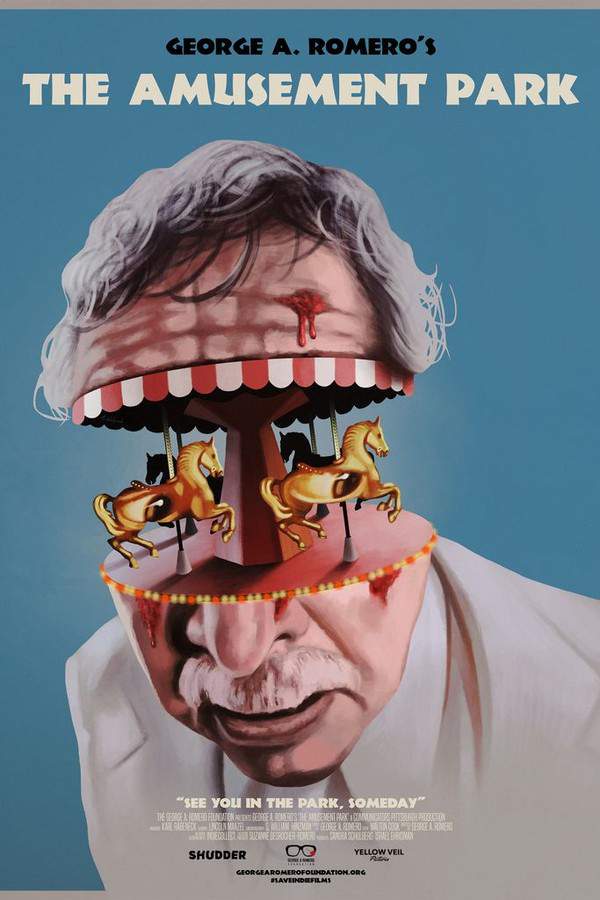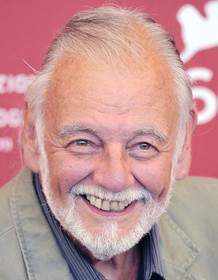
The Amusement Park 2021
Directed by

George A. Romero
Made by

Shudder
Test your knowledge of The Amusement Park with our quiz!
The Amusement Park Plot Summary
Read the complete plot summary and ending explained for The Amusement Park (2021). From turning points to emotional moments, uncover what really happened and why it matters.
The film begins with a poignant prologue delivered by Lincoln Maazel, highlighting the neglect and undervaluation the elderly face in society. He invites the audience to explore a metaphorical portrayal of this mistreatment.
In a stark white room, an elderly man, portrayed by Lincoln Maazel, sits bandaged and bloodied, his once pristine white suit now tarnished. Suddenly, another version of him enters—clean, cheerful, and optimistic. This younger counterpart attempts to engage with his weary self, insisting he should join him at the park, despite the elder’s protest that “there is nothing out there.” Undeterred, the younger man opens a door that seemingly leads to nowhere, but upon stepping through, he finds himself in a vibrant park.
As he strolls through the park, marveling at the ambiance, he encounters a ticket taker who cunningly exploits other older patrons, cheating them with minimal pay. The younger man buys tickets, which are represented as money within the park.
His adventure unfolds as he embarks on a rollercoaster, interacts with a train where an older passenger tragically appears to die and subsequently ignored while in a coffin, and witnesses a man losing his license due to poor eyesight. At the bumper cars, a staged “accident” happens that brings forth a police officer and a lawyer, but the younger man, struggling with his eyesight, realizes he is not seen as a credible source to help.
When he seeks a bite to eat at a food stand, he finds himself sidelined as wait staff cater to a wealthier patron. Ultimately, he manages to receive his meal, displaying his compassion by sharing it with other ignored elders around him.
While shopping for groceries, the man’s arms are laden, leading him to grab only a jar of peanut butter and some crackers. Attempting to connect with some children, he is unfortunately accused of being a “degenerate” by a younger individual and retreats, feeling humiliated. Lured into a building by more young people who promise fun activities, he discovers instead a cramped room of torturous exercise machines designed for elders. After breaking his glasses in the confusion, he stumbles upon a fortune teller. Observing a young couple inquire about their future, the fortune teller reveals a grim fate where they will reside in a dilapidated apartment, receiving little attention from neighbors or doctors. Frustrated by this vision, the young man reacts violently, striking the older man down.
Regaining consciousness, the park has grown eerily empty, save for three bikers who soon assail him and steal his tickets. As more people appear, they all disregard his plight. With scant resources, he heads to a medical center resembling a chaotic shop brimming with elder equipment, where he is hastily treated and given just a band-aid and cane before being expelled. In his quest for a retirement home, he falls victim to a pickpocket, who turns out to manage a freak show featuring casually dressed seniors. Upset by the display, the man attempts to leave but finds himself pursued by agitated patrons accusing him of escaping.
Finally, a glimmer of solace emerges when a little girl invites him to read The Three Little Pigs and share some chicken. Yet, her indifferent mother snatches the book away along with the little girl, driving the elderly man into tears. Leaving the piece of chicken behind, he trudges back to the white room, defeated and resigned. Moments later, a fresh and cheerful version of him re-enters, repeating the earlier scene while the elder watches on, powerless.
As the film draws to a close, Lincoln Maazel reappears, urging viewers to support the elderly through existing community programs, concluding with a hopeful note: “I’ll see you in the park… someday.”
The Amusement Park Timeline
Follow the complete movie timeline of The Amusement Park (2021) with every major event in chronological order. Great for understanding complex plots and story progression.
Prologue of Neglect
The film opens with a moving prologue delivered by Lincoln Maazel, emphasizing the societal neglect and undervaluation the elderly face. He urges the audience to reflect on this pervasive issue as they journey through the narrative.
Elderly Man in Distress
In a stark, white room, an elderly man appears, bandaged and bloodied, symbolizing his suffering. His pristine white suit contrasts sharply with his current condition, setting the stage for his emotional journey.
Young Man's Entrance
A younger version of the elderly man enters, embodying cheerfulness and optimism. He encourages his weary counterpart to join him at the park, despite the elder's reluctance and despair about the outside world.
Journey to the Park
Ignoring the elder's protest, the younger man opens a door that leads to a vibrant park, a vivid contrast to the sterile white room. This marks the beginning of the younger man's explorative adventure through a metaphorical landscape.
Ticket Taker's Exploitation
As the younger man enjoys the ambiance of the park, he encounters a ticket taker who cheats elderly patrons out of their money. This moment highlights the exploitation faced by older individuals in society.
Rollercoaster Ride
In a celebratory moment, the younger man boards a rollercoaster. His exhilaration is short-lived as he witnesses a tragic scene on a train where an older passenger appears to die, highlighting the theme of neglect for the elderly.
Police Involvement
At the bumper cars attraction, a staged accident occurs, provoking the appearance of a police officer and a lawyer. The younger man’s struggle with his eyesight prevents him from being taken seriously, emphasizing his lack of agency.
Dining Experience
Seeking food, the younger man finds himself overlooked as wait staff cater to wealthier patrons. This moment underscores the societal pattern of ignoring the needs of the elderly, even in simple situations.
Encounter with Children
While attempting to connect with children, the younger man suffers humiliation when accused of being a 'degenerate' by a young individual. This painful encounter highlights the generational divide and prejudice against the elderly.
Fortune Teller's Grim Vision
In a moment of curiosity, the younger man visits a fortune teller. The seer reveals a troubling future for a young couple, filled with neglect and solitude, triggering a violent reaction from the young man directed at the elderly.
Abandonment in the Park
As the younger man regains consciousness, he finds the park deserted except for a few bikers who assault him and steal his tickets. This abandonment reflects the isolation many elderly individuals experience in society.
Medical Center Experience
In his pursuit of assistance, the younger man arrives at a medical center that feels chaotic and uncaring. There, he receives minimal treatment, illustrating the lack of support available for the elderly.
Encounter at the Freak Show
The younger man falls victim to a pickpocket, who manages a freak show featuring casually dressed seniors. Upset by this degrading spectacle, he attempts to leave but is chased by angry patrons, further reflecting societal disdain.
A Moment of Connection
In a brief moment of solace, a little girl invites the younger man to read a story and share some food. However, her indifferent mother quickly takes her away, deepening the man's sense of rejection and heartache.
Return to the White Room
Defeated, the elderly man ultimately returns to the stark white room. A fresh version of him re-enters, repeating the earlier hopeful invitation, yet the elder watches in powerless despair as the cycle continues.
The Amusement Park Characters
Explore all characters from The Amusement Park (2021). Get detailed profiles with their roles, arcs, and key relationships explained.
The Old Man (Lincoln Maazel)
The Old Man is a poignant character representing the elderly's struggles in a seemingly cheerful world. His journey through the amusement park reveals his vulnerability and the harsh realities faced by seniors. Through his experiences and interactions, he embodies the theme of isolation and the longing for connection.
Younger Version of The Old Man
The younger version of The Old Man symbolizes hope and resilience, striving to motivate his elder self to embrace life. However, his optimism is challenged by the reality and harshness of the amusement park, showcasing the complexities of aging and the battle between hope and despair.
The Amusement Park Settings
Learn where and when The Amusement Park (2021) takes place. Explore the film’s settings, era, and how they shape the narrative.
Time period
The film subtly addresses timeless issues surrounding the elderly, showcasing systemic neglect without being tied to a specific historical period. It comments on the ongoing societal attitudes towards aging, highlighting how these issues persist across generations.
Location
The Amusement Park
The amusement park serves as a vibrant yet sinister setting, representing the challenges faced by the elderly in society. While initially colorful, it soon reveals darker themes of exploitation and neglect. The medical center reflects chaos and a lack of consideration for older patients, further emphasizing society's disregard for their needs.
The Amusement Park Themes
Discover the main themes in The Amusement Park (2021). Analyze the deeper meanings, emotional layers, and social commentary behind the film.
👵
Elder Neglect
The film powerfully illustrates the neglect and undervaluation of the elderly within society. It presents various instances where older individuals are exploited or ignored, shedding light on their struggles in a world prioritizing youth. Through its narrative, the movie urges audiences to reflect on how these themes affect real lives.
💔
Isolation
Isolation stands as a prevalent theme, demonstrated through the elder's experiences in the amusement park. Despite encountering people around him, he often feels alone and marginalized, highlighting an emotional disconnect prevalent in society as older individuals seek companionship and a sense of belonging.
🌪️
Disillusionment
Throughout his journey, the elderly man's initial excitement turns to despair as he realizes the deceptive nature of the amusement park. What begins as a hopeful exploration ultimately leads to a series of disillusioning and traumatic encounters, mirroring the lost promises of joy in aging.

Coming soon on iOS and Android
The Plot Explained Mobile App
From blockbusters to hidden gems — dive into movie stories anytime, anywhere. Save your favorites, discover plots faster, and never miss a twist again.
Sign up to be the first to know when we launch. Your email stays private — always.
The Amusement Park Spoiler-Free Summary
Discover the spoiler-free summary of The Amusement Park (2021). Get a concise overview without any spoilers.
In a stark, white‑walled introduction, an unnamed elder—portrayed by Lincoln Maazel—is confronted with the quiet desperation of a life slipped past the public’s gaze. The film invites the audience into a metaphorical space that teeters between reality and a nightmarish carnival, using the amusement park as a sprawling allegory for the way society marginalizes its aging members. From the moment the older man steps through a doorway that promises escape, the atmosphere shifts into a kaleidoscope of neon lights, garish rides, and endless crowds that feel simultaneously familiar and distorted.
The park itself becomes a character, its ever‑turning attractions and perpetual motion reflecting the chaotic inner world of the protagonist. Every turn offers a glimpse of ordinary scenes—ticket booths, food stalls, games—reimagined through the lens of memory and neglect. The palette is washed in muted pastels and harsh fluorescents, underscoring a tone that swings between wistful melancholy and unsettling absurdity. The sound design hums with distant laughter and the low‑grade clatter of machinery, creating a sense of both enchantment and entrapment.
At the heart of the story is the elder’s quiet determination to navigate this bewildering landscape, guided only by fragmented recollections of a life once vibrant. His youthful counterpart—an optimistic double who appears in the opening scene—offers a stark contrast, hinting at the internal dialogue between hope and resignation. The juxtaposition of these two selves sets the stage for a meditation on mortality, dignity, and the invisible barriers that keep older individuals on the periphery of a society that touts perpetual youth.
The film’s style balances surreal visual metaphors with a raw, humanistic core, inviting viewers to contemplate how the simple act of aging can feel like wandering an endless fairground where every ride is both a reminder of past joys and a subtle commentary on present neglect. It is an immersive, thought‑provoking portrait of the American experience viewed through the eyes of those most often left behind.
Can’t find your movie? Request a summary here.
Featured on this page

What's After the Movie?
Not sure whether to stay after the credits? Find out!
Explore Our Movie Platform
New Movie Releases (2025)
Famous Movie Actors
Top Film Production Studios
Movie Plot Summaries & Endings
Major Movie Awards & Winners
Best Concert Films & Music Documentaries
Movie Collections and Curated Lists
© 2025 What's After the Movie. All rights reserved.





